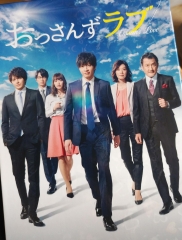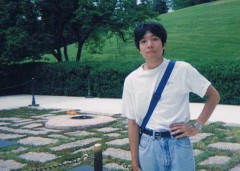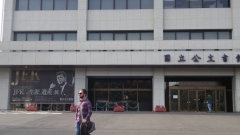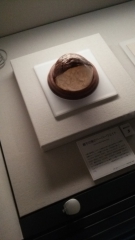18 September 2024
The 21st century version of “Dynasty”
I happen to watch this show while staying at a hotel in Okinawa. The hotel subscribed to Netflix so I could watch this American show on the hotel room TV. The TV show was remake of 1980’s popular soap opera of the same name. I watched that show while I was attending a university in the US. It was 1990’s so I watched the already re-runs of the show. I was addicted to the show, which helped me improve my English ability. The plot was not very much changed from the original version. A woman named Cristal was married to an oil tycoon Blake Carrington and joined his rich family but some people in the family such as her husband’s daughter and ex-wife were hostile to her and had quarrels with them.
But there were some drastic changes in the drama, especially casting and setting of the characters due to the time difference.
1. Normailised portrayal of gay characters; A son of the rich family, Steven was gay. In the original version, Steven and his family struggled with his sexuality and Blake even tried to cut off relationship with his son and removed him from successors of his family business. Cristal, his new wife dissuaded him from doing so because of her gentle character. Steven was married to a woman and had a child to another woman, Cristal’s niece, Sammy Jo. But Steven later got a love affairs with men and his family finally approved of his lifestyle. Although he was a gay character but no kissing scene of two men.
In the new version, nobody questioned Steven’s lifestyle and he and his lover, Sam, Cristal’s nephew were happily married.
2. More characters of colors; in the original version, Cristal was a white woman but new Cristal was a Hispanic woman from Venezuela. Blake’s spoiled and flapper daughter, Fallon had a love affair with a chauffeur who was a white man but in this new version, the chauffeur was a Black man and had relationship with another Black man. Cristal’s nephew Sam who later became Steven’s husband is Hispanic as well.
Sounds good but what is bothersome is these characters or their siblings had some criminal records due to the reality?
In fact, even today, it is unrealistic that a rich conservative white parents would be happy to know their daughter had a love affair with a man of color.
One more thing to note is more independent working female character setting than the original. In the new version, Cristal met Blake on the board meeting of his company as a board member, PR director. Fallon was a board member and later tried to take over her father’s CEO position. In the original Cristal was just Mrs. Blake Carrington and Fallon was just a spoiled child.
Steven was not actively involved in his family’s oil business unlike the original version due to his liberal environmentalist thought.
The new version indeed reflects the trend of 21st century such as more accepting of gay lifestyle and racially diverse demography. It was a good history and social study material for me who enjoyed watching the original.
13:35 Posted in Culture, Film, Media, Society, USA issues | Permalink | Comments (0) | Tags: racism, homosexuality, feminism, gay, lgbt
03 April 2021
Will Japan legalise gay marriage?
Last month, one of Japanese district courts, Sapporo District Court ruled that current Civil Law that does not recognise the same sex couple as legitimate married couple is unconstitutional. It was a revolutionary decision for Japanese judicial administration since Japanese constitution claims that marriage is recognised only if both sexes agree. But the court says this statement does not mean gay marriage is banned but to rule only individuals can decide who to marry. In the old days, it was common that parents of the couple decided who to marry without their will. Gay marriage was out of imagination.
Rather the court paid attention to the other part of constitution that states all the people must be treated equal. So the current Civil law which only admits heterosexual couple to the marriage is unconstitutional.
However, some claim gay marriage is not allowed in the constitution as says “both sexes” and traditional family value does not conform to gay marriage.
As for public opinion survey, Asahi Shimbun Newspaper revealed that 65% of Japanese citizens of all ages support gay marriage. 5 years ago it was less than half. The society has drastically changed recently.
Japanese parliament already has two openly gay members. Their party Constitutional Democratic Party proposes amendment of Civil law.
Even among conservative side, current ruling party LDP, one of young representatives, KOIZUMI Shinjiro, whose father was Prime Minister between 2001 to 2005, said he is for gay marriage and he would be very considerate father if his child’s sexual orientation was same sex person when asked if he was pro-gay marriage and what he would do if his child was gay.
Japan is not Christian nation so religious faith would not be an obstacle. Only the old values and peer pressure are problems. I guess it is a matter of time that Japan approve gay marriage legally and socially.
Currently around 30 nations in the world legalised gay marraige. Among G7 nations Japan is the only nation that does not legalise gay marriage. Marriage equality is an urgent issue if Japan wants to join truly advanced members of the world.
I would be proud of being Japanese and love my country more than ever if that happens.
16:57 Posted in Japan News, Politics, Society | Permalink | Comments (0) | Tags: gay, homosexuality, lgbt
04 May 2020
Introducing Japan's gayest TV drama "Ossan's Love" aired on mainstream TV channel
While I locked down myself to prevent novel corona virus spread at home. I just happened to rent DVD drama programs "Ossan's Love" which was aired in 2018 on one of Japan's mainstream TV network channels, TV Asahi. The drama consists of 7 episodes. Each episode was about 40 minutes long.

What was shocking to me is the comedy drama featured male gay love affairs all the way although it was aired on the mainstream channel and then it became so popular that subsequent film version was released in nationwide theatres and another version of the TV drama was aired on the same time frame next year.
The story took place in a real estate agency in Tokyo. The protagonist is 33 year-old male worker named Haruta (Middle in the picture.) Although the story evolved around him, the most important character was his supervisor Kurosawa (right edge in the photo), 55 year-old man, which in Japan commonly referred to as “Ossan” meaning “Old guy” usually middle aged.
Kurosawa was head of sales department of the real estate agency, equivalent to vice president of the company and a rich man. One day Kurosawa told Haruta that he loved him and would divorce his wife (Second from right) to be with him. Haruta was shocked to know that because he did not share love romance with his supervisor although he respected and liked him as a good business man.
Kurosawa then asked his wife for a divorce and then Haruta got involved in Kurosawas divorce quarrel. But Haruta also got in love affair with another man, Maki (left edge in the photo) in the office. But Maki had another love affair with another male worker. Two gay love triangles crossed over in the drama. Finally Kurosawa proposed marriage to Haruta.
The drama was all about gay love and love romance between man and woman was sidelined in the story. The gay male characters were portrayed as normal and decent person, not like psychopath or deviant ones. This is the big difference from the past. Gay characters were very normal and positive in the mainstream TV drama. Gay love romance was treated just as equivalent to straight people’s love.
Not just broadcast nationally on mainstream media but the show became so popular that film version and another version in which similar gay love story took place in an airline company using the same main casts next year. In 2019 version Kurosawa was a captain pilot of the airplane and Haruta was a flight attendant. Airline company is really existing company meaning commercial airline company sponsored the program.
Recently in Japan, more people have positive views on gay relationship and more people have become supportive of gay marriage. In national assembly there are two openly gay members, who call for legalization of the same sex marriage. Some municipal governments approved of the same sex partnership and provide certificates for the residents.
This show reflects this social change.
If you are interested, you can watch the English version of the show on Netflix.
15:25 Posted in Film, Japan News, Media, Society | Permalink | Comments (1) | Tags: lgbt, gay, homosexuality
22 April 2015
Dear Fellow Americans, JFK Exhibit is held in Tokyo
I went to the exhibition of John Fitzgerald Kennedy at National Archives of Japan located near the Imperial Palace in Tokyo.
I went there with one old American couple whose young days were when JFK were alive as US President. They told me that the assassination was shocking to them because he was very popular at that time.
The admission was free. It has been held since early March and is scheduled to end May 10, 2015. The description of exhibits are mostly Japanese. So I explained to them what each one of exhibits was about. Actually they knew what they were because those things were very familiar with them already.
I focused on one corner. The exhibits that relate to his relationship with Japan before he became a politician.
A cononut paperweight and a letter to former enemy.
These things come from his war-time experience in Solomon islands, Southern Pacific 1943. JFK was on torpedo patrol boat with his crews at night. The boat was hit by Japanese naval destroyer, Amagiri and sunk. JFK and his men were all thrown out to the sea but they swam to one island. There they met locals. JFK asked them to deliver a coconut which the message of calling for help was written on to the US military corp. Then he and his men were all saved. By that incident JFK was awarded medals.
After the war, JFK made the coconut into paperweight as a memorial. JFK wrote the letter to former captain of the destroyer, Hanami telling him that he wanted to meet the captain because yesterday’s enemy turned today’s friend. Later JFK invited him to his presidential election campaign. The captain could not go to the US but his best friend, Onozaki, who was also a crew of the destroyer went. The photo that Onozaki and JFK together were printed out in newspapers in US that might help JFK win the election.
He might have felt saved by the Japanese military. I speculate that the enemy did not shoot at them though they found them in the sea or even gave them a rescue boat or some way to save their lives?
JFK to me has weird relation. When I was in US two decades ago as a college student, some of my classmates said to me that I look like JFK. I was glad to hear that.
I remember when I went to Arlington cemetery in Washington, I could come to his grave without knowing the route, seemed like he invited me.

He and I have things in common. I am Catholic and have back pain problem from young days still struggling with it some time. He and I are very much interested in civil rights advocacy.
The memorable thing I saw in the exhibit was his speech film on Civil Right Act in relation to Alabama state’s defiance to Federal court order to admit Afro-American students to its state university.
He said,
“We preach freedom around the world, and we mean it, and we cherish our freedom here at home, but are we to say to the world, and much more importantly, to each other that this is the land of the free except for the Negroes; that we have no second-class citizens except Negroes; that we have no class or caste system, no ghettoes, no master race except with respect to Negroes?
Now the time has come for this Nation to fulfill its promise. The events in Birmingham and elsewhere have so increased the cries for equality that no city or State or legislative body can prudently choose to ignore them.
The fires of frustration and discord are burning in every city, North and South, where legal remedies are not at hand. Redress is sought in the streets, in demonstrations, parades, and protests which create tensions and threaten violence and threaten lives.
We face, therefore, a moral crisis as a country and as a people. It cannot be met by repressive police action. It cannot be left to increased demonstrations in the streets. It cannot be quieted by token moves or talk. It is time to act in the Congress, in your State and local legislative body and, above all, in all of our daily lives.”
That speech sounds like current President Mr. Obama’s endorsement on gay marriage.
After a half century, a new type of civil rights movement seems to be on. The same rhetoric are used for both pros and cons. Majorities vs. Minorities. Conservatives vs. Liberals.
Federal protection law to ban discrimination based on sexual orientation and gender identity has been on debate.
Just like that State of Alabama rejected court order to provide marriage licenses to gay couples.
That is why Obama is called, Black Kennedy. He succeeded JFK’s will to protect civil rights.
Interestingly enough, unlike race matter, sexual orientation matter is common worldwide. So America can be a good role model for this issue.
In relation to it, this coming weekend April 25 & 26, 2015, Tokyo celebrates gay pride event in Yoyogi Park that includes street parade. I will actually join it. Last March one ward of Tokyo, Shibuya passed an ordinance that provides partnership certificate to gay couples. The first political accomplishment in Japan’s gay movement.
Japan’s public opinion regarding gay issue has recently changed.
According to the recent poll conducted by Mainichi Newspaper, majority of Japanese support gay rights, especially among younger generation. More people approve of gay marriage than those who oppose it.
Is it due to what has happened recently in the U.S. ?
Good role model. Hope US keep being good role model for us.
Since I think of JFK, there are 3 songs that come up with. The songs released in the year he was assassinated. Did he hear the songs and enjoy them?
One is related to civil rights movement, "Blowing in the wind", one implies coming of Vietnam war, "Green Green." The other implies the oppression I am facing with many other people regarding US policy which current US Ambassador to Japan, Caroline Kennedy (JFK’s daughter) has to deal with.
15:16 Posted in Japan News, Music, Politics, Tokyo Life, US-Japan relationship | Permalink | Comments (0) | Tags: history, jfk, war, homosexuality, gay, lesbian, college days







